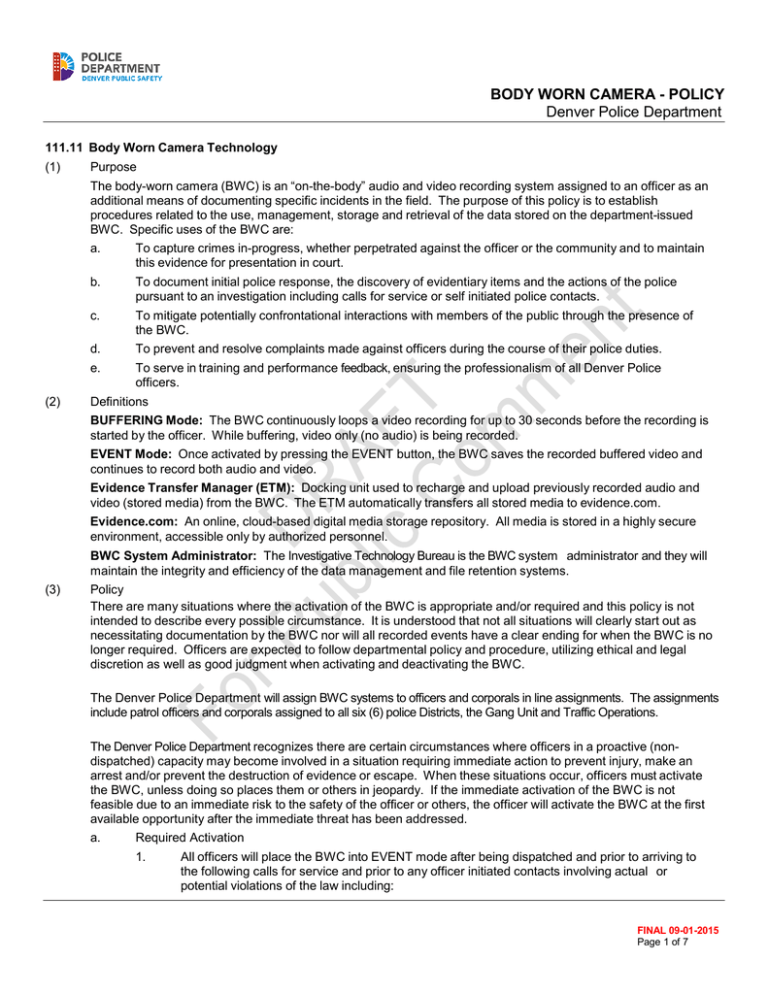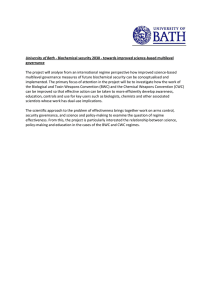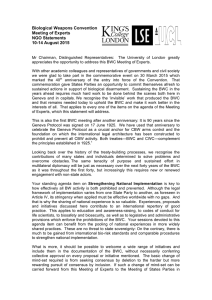BODY WORN CAMERA - POLICY Denver Police Department
advertisement

BODY WORN CAMERA - POLICY Denver Police Department 111.11 Body Worn Camera Technology (1) Purpose The body-worn camera (BWC) is an “on-the-body” audio and video recording system assigned to an officer as an additional means of documenting specific incidents in the field. The purpose of this policy is to establish procedures related to the use, management, storage and retrieval of the data stored on the department-issued BWC. Specific uses of the BWC are: (2) a. To capture crimes in-progress, whether perpetrated against the officer or the community and to maintain this evidence for presentation in court. b. To document initial police response, the discovery of evidentiary items and the actions of the police pursuant to an investigation including calls for service or self initiated police contacts. c. To mitigate potentially confrontational interactions with members of the public through the presence of the BWC. d. To prevent and resolve complaints made against officers during the course of their police duties. e. To serve in training and performance feedback, ensuring the professionalism of all Denver Police officers. Definitions BUFFERING Mode: The BWC continuously loops a video recording for up to 30 seconds before the recording is started by the officer. While buffering, video only (no audio) is being recorded. EVENT Mode: Once activated by pressing the EVENT button, the BWC saves the recorded buffered video and continues to record both audio and video. Evidence Transfer Manager (ETM): Docking unit used to recharge and upload previously recorded audio and video (stored media) from the BWC. The ETM automatically transfers all stored media to evidence.com. Evidence.com: An online, cloud-based digital media storage repository. All media is stored in a highly secure environment, accessible only by authorized personnel. BWC System Administrator: The Investigative Technology Bureau is the BWC system administrator and they will maintain the integrity and efficiency of the data management and file retention systems. (3) Policy There are many situations where the activation of the BWC is appropriate and/or required and this policy is not intended to describe every possible circumstance. It is understood that not all situations will clearly start out as necessitating documentation by the BWC nor will all recorded events have a clear ending for when the BWC is no longer required. Officers are expected to follow departmental policy and procedure, utilizing ethical and legal discretion as well as good judgment when activating and deactivating the BWC. The Denver Police Department will assign BWC systems to officers and corporals in line assignments. The assignments include patrol officers and corporals assigned to all six (6) police Districts, the Gang Unit and Traffic Operations. The Denver Police Department recognizes there are certain circumstances where officers in a proactive (nondispatched) capacity may become involved in a situation requiring immediate action to prevent injury, make an arrest and/or prevent the destruction of evidence or escape. When these situations occur, officers must activate the BWC, unless doing so places them or others in jeopardy. If the immediate activation of the BWC is not feasible due to an immediate risk to the safety of the officer or others, the officer will activate the BWC at the first available opportunity after the immediate threat has been addressed. a. Required Activation 1. All officers will place the BWC into EVENT mode after being dispatched and prior to arriving to the following calls for service and prior to any officer initiated contacts involving actual or potential violations of the law including: FINAL 09-01-2015 Page 1 of 7 BODY WORN CAMERA - POLICY Denver Police Department a. Traffic stops b. Pedestrian, citizen and/or vehicle contacts c. All calls requiring the presence of a Crisis Intervention Team (CIT) officer d. Reported weapons calls e. All calls involving suicidal individuals f. When engaging in a foot chase (if the BWC was not placed in EVENT mode prior to the foot chase, officers are required to place the BWC into EVENT mode as soon as the situation has stabilized and it is safe to do so) g. Any encounter that becomes adversarial h. When engaging in a forced entry i. To assist in documenting warrantless or consensual searches of individuals, vehicles, buildings and other places j. 2. • The BWC will be utilized to record the request and consent. This recording is intended to enhance a documented consent; it is not intended to replace the use of the Consent to Search form (DPD 272). • The existence of the recorded request will be documented in the officer’s statement. • The BWC can be used to record the search itself. To assist in documenting an individual ‘s Miranda Advisement • The BWC will be utilized to record the advisement and the subject’s responses when practical. This recording is intended to enhance a documented consent. It is not intended to replace the use of Juvenile Advisement/Waiver Form (DPD 102) or the Advisement form (DPD 369). • The existence of a recorded advisement will be documented in the officer’s statement. k. All arrests and/or citations l. Any situation that the officer believes the use of the BWC would be appropriate or would provide valuable documentation if not already activated per policy Once placed in EVENT mode, the BWC will remain on and not be turned off unless the initial incident that caused the activation has stabilized; upon request of the victim; or as ordered by a supervisor. For the purposes of this section, an incident is considered stabilized when the initial police response or exchange of communication related to police enforcement activities has transitioned to a controlled and orderly investigation. a. Officers will document the reason that the BWC has been deactivated in the form of a recorded announcement on the BWC prior to deactivation. b. If an officer is on a perimeter post or assigned to a static post where he/she is not in contact with citizens, involved in an enforcement action or actively part of the investigation, then he/she may deactivate the BWC to conserve battery life. The BWC will be reactivated if any of these fail to apply. c. Once the situation has stabilized, if it is necessary to discuss issues or concerns with an officer, supervisor, doctor, nurse or paramedic in private, or if the information to be conveyed is not part of an investigative case, the BWC may be switched to BUFFERING mode. As soon as the private conversation is completed, the BWC will be returned to EVENT mode so long as the situation still falls under the definition of required use. Officers are reminded that when the BWC is placed back to EVENT mode, the prior 30 seconds of video (no audio) will be saved. FINAL 09-01-2015 Page 2 of 7 BODY WORN CAMERA - POLICY Denver Police Department b. Restricted use of the BWC system and/or stored media 1. Officers will only use a BWC that has been approved and issued by the Denver Police Department. The use of personal video recorders is prohibited. 2. All audio, images and media associated with the BWC are the property of the Denver Police Department and these items are not to be copied, released or disseminated in any form or manner outside the parameters of this policy without the expressed written consent of the Chief of Police. Under no circumstances will any employee of the Denver Police Department make a personal copy of any recorded event without the written consent of the Chief of Police (e.g. using a cellular telephone or other recording device to record BWC media). Lead investigators may create a secondary copy of a BWC recording subsequent to an official investigation and will ensure that the copy remains attached to the case file. 3. Under no circumstance, except those instances involving an investigation of department personnel, will a conversation between department employees be recorded without all parties to the conversation being aware of the fact that it is being recorded. Conversations that are not required to be captured as evidence in the furtherance of completing a police report and/or subsequent police investigation will not be recorded. 4. The BWC will not be activated in places where a reasonable expectation of privacy exists (such as detox, medical, and/or healthcare facilities, locker rooms or restrooms, etc.) unless the activation is for the purpose of official law enforcement activity such as a call for service or if the activation is required policy. a. (4) 5. Officers will only use the BWC in patient care areas of a healthcare facility and/or ambulances when the recording is for official purposes and caution should be used to record only the parties involved in the event being investigated. Prior to conducting a strip search, the officer will record a 360-degree video of the location where the strip search will be conducted. During the actual strip search, the BWC will be utilized to only capture audio of the event by positioning the camera away from the individual to be searched (see OMS 104.01 (8) for authorization). 6. Officers are not authorized to playback BWC recorded media for citizen viewing. Officer Responsibilities a. Officers will not use the BWC system or evidence.com until they have successfully completed the required training. b. Officers will ensure the following when assigned a BWC at the beginning of each shift/tour of duty: 1. Officers are responsible for the care and maintenance of the BWC assigned to them. The BWC is to be operated and maintained according to the manufacturer’s instructions and recommendations. If an officer has BWC equipment that is not functioning or appears to be damaged/ broken, they will immediately notify their supervisor. 2. The BWC will be properly affixed upon the officer’s uniform in accordance with departmental regulations and manufacturer’s guidelines. The camera will only be mounted on the officer’s uniform with the department approved collar, helmet, head and sunglass mounts. Any modification to the BWC unit or mounting is prohibited. Each officer will ensure that their camera is positioned correctly and verify the camera position by use of the viewer. The BWC will be worn for the entire shift. 3. Under normal operation, the BWC’s audible alert signal must remain in the ON position. The audible alert signal may be muted for tactical situations; however the audible alert signal must be immediately reactivated at the conclusion of the tactical portion of the incident. 4. In order to record all situations required by this policy, the officer must maintain the BWC in a constant state of operational readiness. Operational readiness means that the BWC has adequate battery life/available storage, remains properly affixed to the officer’s uniform and is set to BUFFERING mode. FINAL 09-01-2015 Page 3 of 7 BODY WORN CAMERA - POLICY Denver Police Department c. Officers will document the use of the BWC within reports, citations, log sheets, arrest book-ins, and/or street checks within the first line of any text entry. d. Officers are encouraged to notify the public that the BWC is activated and recording. Under most circumstances, notification has shown to diffuse incidents. However, there may be times that this is impractical or that the notification could diminish lines of communication. Officer discretion should be utilized and generally favor notification over non-notification. e. Officers are authorized to review their own BWC recording when preparing official written documentation of a specific event. Officers may only review recordings from their assigned BWC. The viewing will be utilized as a tool when completing written reports to ensure accuracy. The following are exceptions to the above: f. 1. If the officer is involved in (or witness to) a use of force incident that per policy requires the response of an Internal Affairs Division investigator, the officer may be authorized to view their BWC recording after the Internal Affairs Division investigator has been consulted. The viewing of any BWC recording will only be permitted after receiving authorization from the Internal Affairs Division investigator acting under the direction of the commander of the Internal Affairs Division. 2. If the officer is involved in (or witness to) a critical incident such as a police shooting, an incustody injury resulting in death or other critical incident as defined in the Operations Manual, the officer is authorized to view their BWC recording only after the approval of the commander of the Major Crimes Division or their designee. Officers will appropriately tag each recorded video. 1. I.D. section: The recording officer will enter the GO/CAD number in the following format: Two digit year – GO/CAD number (e.g., 15-123456) 2. 3. Category section: The officer will select the most appropriate category from the drop down menu. • Death Investigation: Homicide, Known/Unknown Dead, In-Custody Death, Arson Investigation resulting in death, Vehicular Homicide, Hit and Run resulting in death. This category includes the attempt of any of the listed crimes. • Sex Assault on a Child: Sex Assault on a Child. This category includes the attempt of the listed crime. • Missing Person/Kidnapping: Missing Person and Kidnapping. This category includes the attempt of the listed crimes and excludes runaways. • Sexual Assault: Sexual Assault. This category includes the attempt of the listed crime. • Felony – Other: Robbery, Felony Assaults, Arson not resulting in death, Child Abuse, Burglary, Felony Theft, Auto Theft, Theft from Motor Vehicle and any other felony crime not designated under any other listed/available category. • GO Created: Any misdemeanor crime, any time a GO report is created, a citation is issued or an arrest occurs that does not fit under any other listed category. This category includes both state misdemeanors and municipal violations. • Non Event – All Other: All contacts that do not result in an arrest or citation being issued, does not result in a GO report and does not fit any other listed category. (e.g., neighbor disputes, street checks, traffic warning, accidental activation) Title section: If a use of force occurred, the officer will enter “UOF”. If an arrest occurred, the officer will enter “ARST”. • Officers are encouraged to enter additional useful information in the Title section. An example would be the location of the incident and/or the suspects name and date of birth. This is not required, however it is strongly encouraged. FINAL 09-01-2015 Page 4 of 7 BODY WORN CAMERA - POLICY Denver Police Department g. (5) (6) Prior to going off-duty, officers will place the BWC into the Evidence Transfer Manager (ETM) for charging and uploading of all stored media to evidence.com. The BWC will not be removed from the ETM until the media has been fully uploaded and the battery is fully recharged. Investigative Responsibilities a. Investigators will not use the BWC system or evidence.com until they have successfully completed the required training. b. When assigned a case for investigation, the assigned investigator will: 1. Determine the identity of all involved officers. 2. Search evidence.com for any associated BWC media, using multiple search parameters in order to verify that they have located all relevant files. 3. Create a digital media file “folder” within evidence.com. The investigator will add all relevant/associated BWC media into the folder. 4. Verify the accuracy of the category section, ensuring it is in accordance with the correct Colorado Revised Statute. If the category section is incorrect, the investigator is responsible for entering the correct category (see section (4)f above). 5. View all of the applicable BWC media and will notate in their supplemental report that BWC media does exist. Supervisor Responsibilities a. Supervisors will not use the BWC system or evidence.com until they have successfully completed the required training. b. When an incident arises that requires the immediate retrieval of BWC media for chain of custody purposes (including, but not limited to: serious crime scenes, officer involved shootings, critical incidents or other incidents as determined by policy/supervision) a supervisor will respond to the scene and ensure the BWC remains affixed to the officer in the manner it was found and that the BWC data remains uncompromised. Through direct and uninterrupted supervision, the supervisor is responsible for the care and custody of the BWC until it has been removed and secured by the lead investigator. c. Supervisors are required to review BWC media under the following circumstances and/or when the following reports are generated. 1. Use of Force Report (DPD 12) 2. Injury While in Custody and Injury Prior to Arrest Report (DPD 12I) 3. Forced Entry Report (DPD 460) 4. The supervisor is investigating a specific act of officer conduct. 5. The officer has been placed on a performance improvement plan to address identified behavioral or performance deficiencies. 6. BWC media can be reviewed for both commending and counseling officers. 7. Requests to review BWC recordings outside of these parameters must be made to and approved by the officer’s commander or above. 8. The aforementioned is not meant to limit or restrict the Department’s review as part of an official investigation. d. Documentation will include whether the BWC media was reviewed and a synopsis of what is contained in the video footage. If an incident did not generate any BWC media or if the BWC media has no value, supervisors will document why and the circumstances. e. When a supervisor is notified of a malfunctioning camera, the supervisor will ensure that the camera is operational prior to deploying the camera. If the supervisor is unable to deploy the camera, the BWC Program Administrator will be notified. FINAL 09-01-2015 Page 5 of 7 BODY WORN CAMERA - POLICY Denver Police Department (7) f. All officers, with the rank of lieutenant or higher, will have access to view BWC media in evidence.com for the officers assigned to their respective assignments, except for cases that have restricted access. All viewing of BWC media in evidence.com is documented in an online audit trail. g. Supervisors will ensure that every officer has turned in their assigned BWC prior to going off-duty. BWC System Administrator Responsibilities The BWC system will be administered through the Investigative Technology Bureau, they are responsible for: a. Ensuring that officers are trained in the use of the BWC system and equipment prior to issuance. b. Ensuring that the BWC equipment meets the standards and requirements of the Denver Police Department. c. Providing administrative support with regard to the BWC system. d. Assigning personnel for the purpose of “sharing” BWC digital media evidence with both the District Attorney’s and the City Attorney’s Office. All requests for evidence will be in writing from the respective agency. 1. 2. Requests from the District Attorney’s Office: • All BWC digital media evidence will be shared with the District Attorney’s Office once cases have been accepted for filing in court. This includes privatized and restricted access video. • Personnel will locate the BWC digital case folder that was created by the investigator in evidence.com and “share” the BWC digital case folder with the currently approved District Attorney’s Office user group identified within evidence.com. • Any subsequent BWC digital media evidence will be added to the case folder and shared with the District Attorney’s Office. Requests from the City Attorney’s Office • (8) (9) These incidents are typically not investigated by a detective or other investigator and the BWC digital media folder needs to be created (see section 5(b) above). The BWC media needs to be added to the newly created digital media case folder and then “shared” with the currently approved City Attorney’s Office user group identified within evidence.com. e. Assisting in data collection reporting. These reports include, but are not limited to, monthly usage audits, video storage audits, viewing audits and other audits as requested. f. Providing technical support for malfunctioning BWC equipment and facilitate all warranty repairs with the vendor. Data Management and File Retention/Disclosure a. All recorded BWC media will be uploaded and retained in evidence.com in accordance with the current retention schedule. The retention of all BWC media will comply with all applicable State of Colorado statutory requirements regarding criminal justice record management and evidence retention and will be based upon the current City and County of Denver Retention Guidelines. All BWC media will be purged from the system in accordance with the current retention schedule. b. Access to all BWC stored media will be restricted to authorized users and the viewing of any BWC footage will be restricted to legitimate law enforcement or administrative purposes. c. Any request for BWC media made from outside the Denver Police Department, including other law enforcement agencies, the District or City Attorney’s Office, and/or any city agency will comply with both the records disclosure and records management policies of the department (See OMS 109.04 and 109.05). Violations Failure to adhere to the recording requirements of this policy will result in the following discipline: 1. st 1 violation in a 12-month period: Written Reprimand FINAL 09-01-2015 Page 6 of 7 BODY WORN CAMERA - POLICY Denver Police Department 2. nd 2 violation in a 12-month period: 1 fined day Concurrent with the second violation, an in-depth audit of the officer’s data usage will be conducted and documented. This documentation will be forwarded to the Professional Standards Unit and will generate a formal Personnel Assessment System (PAS) review. rd 3. 3 violation in a 12-month period is considered a repeated violation and will generate a formal disciplinary case 4. Purposeful, flagrant or repeated violations will result in more severe disciplinary action. At any time during review, if deemed necessary, violations can be removed from the scheduled discipline above and transitioned to a formal investigation governed by the discipline matrix. FINAL 09-01-2015 Page 7 of 7



